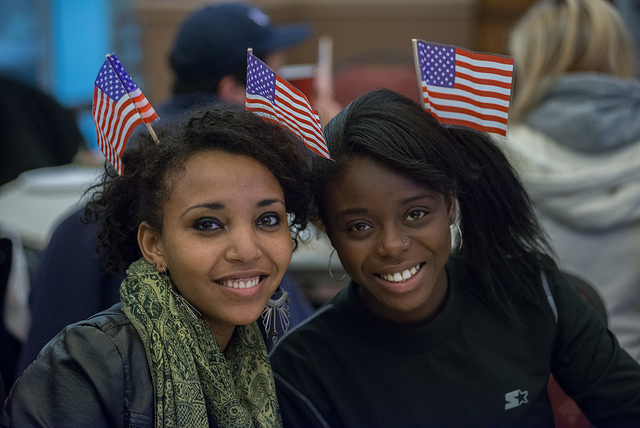What it means to be black in the American educational system

Kevin O’Neal Cokley, University of Texas at Austin
Many people still think that racism is no longer a problem in America. After the election of President Obama, academic John McWhorter argued that
racism in America is, for all intents and purposes, dead. The prominent conservative scholar and African-American economist Thomas Sowell has argued that “racism isn’t dead, but it is on life support.” Harvard professors William Julius Wilson and Roland Fryer too have argued about the declining significance of race and discrimination.
However, as we wind down the final months of Obama’s presidency, the declining significance of race and discrimination narratives seem to be at odds with the lived realities for African-Americans. President Obama himself has faced racist treatment, such as the birther controversy and a member of Congress saying “you lie.” And then, one incident after another has highlighted the painful reality that black men are disproportionately likely to die at the hands of the police in comparison to any other demographic group.
Sadly, racism and discrimination are facts of life for many black Americans. As an African-American scholar who studies the experiences of black college students, I am especially interested in this issue. My research has found that black college students report higher levels of stress related to racial discrimination than other racial or ethnic groups. The unfortunate reality is that black Americans experience subtle and overt discrimination from preschool all the way to college.
Here’s what studies show
The results of a recent survey by the Pew Research Center underscore this point. The survey found that black Americans with some college experience are more likely to say that they have experienced discrimination compared to blacks who did not report having any college experience.
Additional survey results revealed several differences between blacks with college experience versus blacks without college experience. For example, in the past 12 months, 55 percent of people with some college experience reported people had acted suspicious of them, compared to 38 percent of those with no college experience.
Similarly, 52 percent of people with some college experience reported people had acted as if they thought the individual wasn’t smart, compared to 37 percent of people with no college experience.
So, what are the race-related struggles experienced by African-American students throughout their schooling?
Story of Tyrone
Let’s consider the case of Tyrone. Tyrone is a four-year-old black male raised in a two-parent household. Like most four-year-olds, Tyrone is intellectually curious, and has a vivid imagination. He loves books, loves to color and paint, and also loves physical activities such as running, jumping and playing games with his friends.

Teacher image via www.shutterstock.com
Behaviorally, Tyrone is also similar to many four-year-olds in that he often likes to talk more than listen, and he can be temperamental. He can engage in hitting, kicking and spitting behaviors when he is angry.
One day Tyrone was playing a game with a friend and he lost. Tyrone got angry and threw the ball at his friend. A teacher witnessed that and immediately confronted Tyrone about his behavior.
Angry about being confronted, Tyrone started to walk away. The teacher grabbed his arm. Tyrone reacted by pushing the teacher away. The teacher sent Tyrone to the principal’s office. After consultation with the principal, Tyrone was deemed to be a danger to students and staff.
He was consequently suspended.
Early years of schooling
On the surface this looks like a simple case of meting out the appropriate punishment for perceived serious student misbehavior. There does not appear to be anything explicitly racial about the interaction.
However, consider the fact that there have been many instances of white students engaging in the same behavior, none of which ever result in suspension. This is the racialized reality black students experience every day in American schools.
Black boys are almost three times as likely to be suspended than white boys, and black girls are four times as likely to be suspended than white girls. Black students’ (mis)behavior is more often criminalized compared to other students.

Children image via www.shutterstock.com
While black kids make up 18 percent of preschool enrollment, they represent 48 percent of students receiving one or more suspensions. Getting suspended matters because it is correlated with being referred to law enforcement and arrested. Black students account for 27 percent of students who are referred to law enforcement and 31 percent of students who are arrested, while they only make up 18 percent of enrolled students. As a general rule, black students do not often receive the benefit of the doubt when they engage in bad or questionable behavior.
School experience
When Tyrone entered fourth grade, teachers noticed a change in his demeanor. His enthusiasm for school and learning had diminished considerably. He no longer eagerly raised his hand to answer questions. He no longer appeared to love books and listening to stories. He appeared to have little joy participating in class activities. His teachers characterized Tyrone as “unmotivated,” “apathetic,” having “learning difficulties” and “a bad attitude.”
Educators and researchers have referred to this phenomenon as “the fourth grade failure syndrome” for black boys. Early childhood educator Harry Morgan suggested that this phenomenon occurred during this time because the classroom environment changes between the third and fourth grade from a socially interactive style to a more individualistic, competitive style.

Boy image via www.shutterstock,com
This change in style is counter to the more communal and cooperative cultural learning environment which, according to research, black students tend to prefer. The fourth grade failure syndrome refers to a bias in schools (e.g., cultural insensitivity, disproportionately harsh discipline, lowered teacher expectations, tracking black students into special education or remedial classes) that has the cumulative effect of diminishing black students’ (especially boys’) enthusiasm and motivation for school.
By high school Tyrone no longer identified with school. His sense of pride and self-esteem increasingly came from his popularity and his athletic abilities rather than his intelligence. Psychologist Claude Steele has referred to this as “academic disidentification,” a phenomenon where a student’s self-esteem is disconnected from how they perform in school.
Tyrone is not alone. According to one study based on national data from almost 25,000 students black males were the only students that showed significant disidentification throughout the 12th grade. My research too has confirmed this, although I did not find evidence among black females, white males or white females.
What’s the college experience?
While the narrative of more black men being in prison than in college has been thoroughly debunked by psychologist Ivory Toldson, it is still the case that black men are underrepresented in college. According to data from the U.S. Census Bureau, there were 887,000 black women enrolled in college compared to 618,000 black men.
Owing in large part to the emphasis of education by his family, Tyrone is fortunate enough to be accepted to college. Excited and nervous about being away from home, Tyrone looks forward to starting his college experience.
Like many college students, Tyrone likes to go to parties thrown by Greek organizations, and he frequently attends parties thrown by black fraternities. While attending one party, Tyrone and his friends became upset when campus police broke up the party because of complaints of loud music and threaten to arrest the attendees.
Tyrone has partied with white friends and knows firsthand that their parties often involve drugs and reckless behavior, yet, as my students tell me, police almost never break up their parties. As it turns out, white fraternities are frequently the perpetrators of racist incidents, which cause Tyrone and other black students to engage in campus protests.
For example, in 2014, Tau Kappa Epsilon, a fraternity at Arizona State University, was suspended for having a racist Martin Luther King Jr. party at which they drank from watermelon cups, held their crotches, wore bandannas and formed gang signs with their hands.
Resilience
To add insult to injury, Tyrone and other black students read opinion pieces in the student paper complaining how affirmative action discriminates against white students and allows less qualified “minority” students on campus.
Tyrone finds refuge in black studies classes, where he learns about theories such as “critical race theory” and terms such as “institutional racism,” “white privilege” and “hegemony.” Exposure to these classes provides Tyrone with the vocabulary and critical analytical tools to better understand the challenges facing black people.

chandlerchristian, CC BY-NC-ND
So it is not surprising that college-educated blacks like Tyrone are more likely to report experiencing discrimination in college than blacks with no college experience in college environments where racist incidents and racial microagressions are frequently reported. In spite of the desire among many for America to be colorblind, at every level of education black students experience disproportionate amounts of discrimination.
In many ways my research on African-American students reflects my own experiences as a black male negotiating the challenges of being in predominantly white academic environments. The silver lining to this story is that black students are incredibly resilient and there are positive things to report.
In 2016, for example, enrollment at historically black colleges and universities has increased. It is difficult to know if this increase is related to the negative experiences of discrimination black students often experience on predominantly white campuses, but it does suggest that interest among black students in obtaining a college education remains high. According to 2016 data reported in the Journal of Blacks in Higher Education, black women now have the highest graduation rate of any demographic group at the University of Georgia.
For every positive outcome for students like Tyrone, there are unfortunately also too many negative outcomes for other similar students. The educational experiences of Tyrone and all black students matters should be of concern to everyone.
While education is not a cure all for experiences with racism and discrimination, education can equip us with the tools to better understand, analyze and ultimately find solutions to the tragic incidents we are seeing too frequently involving police killings of black people.
![]()
Kevin O’Neal Cokley, Professor of Educational Psychology and African and African Diaspora Studies, University of Texas at Austin
This article was originally published on The Conversation. Read the original article.






